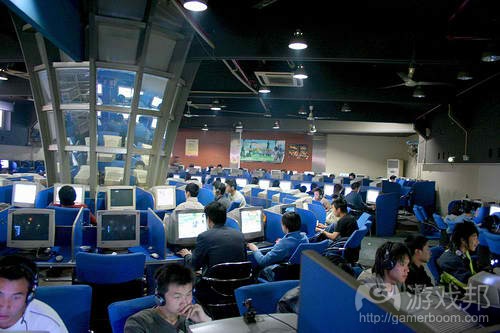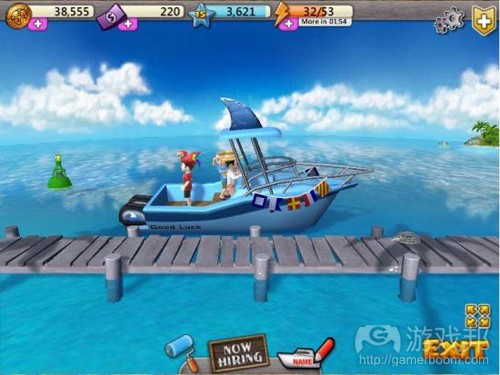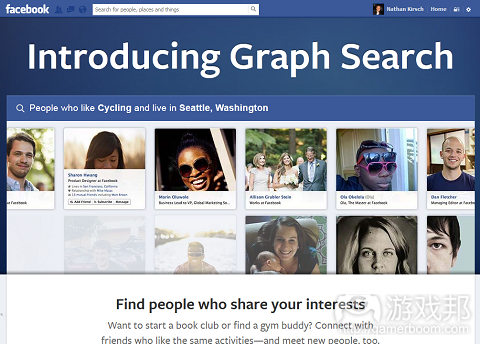每日观察:关注Facebook新功能Graph Search(1.16)
1)投资银行Digi-Capital最新报告预测,网络及移动游戏在全球电子游戏收益中将占半数以上比例,其中以亚洲和欧洲最为领先。
2012财年全球网络和移动游戏收益已达310亿美元,在所有电子游戏收益中占比49%。预计到2016年,全球电子游戏收益中将达830亿美元,网络和移动游戏则占比57%(即480亿美元)。
预计2015年,亚洲和欧洲网络及移动游戏收益在全球占比87%,而亚洲市场则将独占半数以上比例(游戏邦注:届时中国将占比32%,韩国占比12%,日本占比10%)。
中国、日本和韩国电子游戏行业将实现高达50%的营业利润,最高峰的同时在线人数将达2000万。
这也意味着亚洲公司将更有可能在海外市场进行投资和扩张,在2012年全球电子游戏并购交易中,中国、日本和韩国收购公司占比70%左右。
此外,预计到2016年,免费增值游戏将在所有应用收益中占比55%,在移动应用下载量中占比93%。
2)Playnomics最新数据显示,阿拉斯加城市安克雷奇拥有全美最高的每付费用户平均收益,以及最高的盈利率,这意味着该地拥有最高的社交游戏付费用户比例(游戏邦注:Playnomics调查样本为PC、平板电脑和智能手机平台的3000万社交游戏玩家)。
数据还显示,英国玩家在社交游戏中投入时间是一般用户的两倍。
从全球范围来看,2012年第四季度一般玩家在社交游戏中平均投入时间为154.1分钟,平均每人玩5.6次,平均每次为23.7分钟;女性玩家玩社交游戏的次数比男性用户多22%。
从用户粘性来看,美国位居第149名,而前三名则分别是英国、爱尔兰和马其顿。
3)据gamezebo报道,社交游戏公司Kabam日前宣布收购温哥华工作室Exploding Barrel Games(代表作为Facebook游戏《Margaritaville Online》,并曾参与开发《极品飞车》、《Skate》、《FIFA》等游戏)。
4)据gamasutra报道,Facebook在最近新闻发布会中公布了一项名为“Graph Search”的新功能(目前仍在测试),用于帮助用户寻找包括社交游戏在内的Facebook内容。
据Facebook成员Tom Stocky及Lars Rasmussen介绍,Graph Search与一般的网络搜索服务不同,网络搜索是通过一系列关键字(例如hip hop)寻找最为匹配的结果,而Graph Search则是结合短语(例如“在纽约并且喜欢Jay-Z的好友”)来瞄准特定地区的人及其分享到Facebook上的照片和其他内容。此外,Graph Search与网络搜索的另一个不同点还在于,Facebook上每个内容都有自己的受众,并且多数内容属于非公开性质。
Graph Search设计之初就已考虑到用户隐私的概念,它尊重每个Facebook内容的用户及其受众的隐私,它更便于用户搜索新内容,但用户只能看到已经在Facebook上可见的内容。
目前Graph Search初级版本主要用于搜索人、照片、地点和兴趣,包括游戏内容。(本文为游戏邦/gamerboom.com编译,拒绝任何不保留版权的转载,如需转载请联系:游戏邦)
1)Asia, Europe will make up 87% of global mobile, online game revenue in 2015 – report
By Mike Rose
According to a new and extensive report from investment banking services company Digi-Capital, revenue from online and mobile games will soon make up more than 50 percent of global video game revenue — and this shift will be dominated by Asia and Europe.
As it stands, revenue from this rapidly growing sector is currently around $31 billion for the 2012 fiscal year, making up 49 percent of all revenue from video games during the year.
However, by 2016 Digi-Capital believes that online and mobile games will make up 57 percent of global revenue from video games — roughly $48 billion of a total $83 billion.
And by 2015, the company expects Asia and Europe to take 87 percent of all worldwide revenue from mobile and online games, with Asia in particular accounting for more than half (32 percent in China, 12 percent in South Korea and 10 percent in Japan).
The report notes that the Chinese, Japanese and South Korean video game industries are producing very cost efficent game businesses that see up to 50 percent operating margins, while high volumes of up to 20 million peak concurrent users across these territories help to push margins up.
This also means that Asian businesses can afford to invest significantly in foreign markets — indeed, in 2012 there were more video game mergers and aquisitions than ever before, and around 70 percent of the most notable were made by Chinese, Japanese or South Korean buyers.
However, as Tim Merel, managing director at Digi-Capital, notes, “Knowledge and relationship gaps remain for mergers and acquisitions/investment between Asian/Western markets and across games market sectors.”
Elsewhere, Merel says that by 2016, free-to-play games will make up around 55 percent of app revenue, and a whopping 93 percent of mobile app downloads.
“The basis of competition across games market sectors is moving towards free-to-play and communal (competitive/collaborative) games and business models,” he says. “Gamification is attracting significant early stage investment, although much development remains for that market to achieve its potential.” (source:gamasutra)
2)The spendy social gamers of Anchorage (and other facts about mobile gaming habits)
Jeffrey Grubb
Anchorage, Alaska: It’s cold, remote, and filled with people who spend money on social games.
According to Playnomics, the Alaskan city has the highest average revenue per paying user in the United States. It is also has the highest monetization rate, which means Anchorage has the highest percentage of people who spend money on social games.
This data comes from Playnomics’ report for the fourth quarter of 2012. The research firm collects anonymous information from publishers and developers around the globe. For this study, Playnomics sampled 30 million players of social games on PC, tablet, and smartphone.
Its data also reveals that players in the United Kingdom spend the twice the average amount of time playing social games.
Globally, the average player spent 154.1 minutes playing social games in the last quarter of 2012. That’s an average of 5.6 play sessions for an average of 23.7 minutes per person.
Playnomics also reveals a gender gap. Female gamers played 22 percent more sessions than their male counterparts.
Overall, the United States is 149th in terms of average engagement. The top three? United Kingdom, Ireland, and Macedonia.(source:venturebeat)
3)Kabam acquires Exploding Barrel Games
By Joe Jasko
Kabam, “the leader in free-to-play games for core players” and the team behind the hugely successful Kingdoms of Camelot: Battle for the North, have announced today their acquisition of Exploding Barrel Games. You may know Vancouver-based Exploding Barrel Games for their popular (and equally delicious) Margaritaville Online Facebook game, and for their contributions to the Need for Speed, Skate, FIFA, and SSX franchises.
In Kabam’s press release, both parties expressed great excitement and anticipation for their future business together. After all, “Exploding” and “Kabam” just seem like two wonderfully explosive and volatile words that are meant to go together, don’t they? Andrew Sheppard, Kabam’s President of Studios, spoke of Exploding Barrel’s talents, and discussed how he hopes to utilize their assets going forward:
“With experience working on multi-billion dollar franchises like Need for Speed and EA Sports titles, and developing blockbusters in nearly every core genre, the team at Exploding Barrel Games is a perfect complement to Kabam’s mission to blend the art of game design with the science of free-to-play distribution.”
In the six short years since the company’s creation, Kabam has become an unexpected powerhouse in the social gaming scene, so it’s only fitting that they take to their global expansion head-on. In the last year alone, Kabam topped their $100 million gross revenue in 2011 by 60%, and saw their social city-building game Kingdoms of Camelot: Battle for the North rank first on Apple’s Highest Grossing Apps list for 2012. That’s pretty impressive if you ask me.(source:gamezebo)
4)’Graph Search’ could help Facebook users find your game more easily
By Kris Graph
At a press event on Tuesday, Facebook unveiled a new way for its users to proactively seek out Facebook content, including social network games.
Dubbed “Graph Search” (currently in beta), the new feature does not function the same way as keyword-based web searches. Facebook’s Tom Stocky and Lars Rasmussen explained in a statement:
“Graph Search and web search are very different. Web search is designed to take a set of keywords (for example: “hip hop”) and provide the best possible results that match those keywords.
With Graph Search you combine phrases (for example: “my friends in New York who like Jay-Z”) to get that set of people, places, photos or other content that’s been shared on Facebook. We believe they have very different uses.
Another big difference from web search is that every piece of content on Facebook has its own audience, and most content isn’t public. We’ve built Graph Search from the start with privacy in mind, and it respects the privacy and audience of each piece of content on Facebook. It makes finding new things much easier, but you can only see what you could already view elsewhere on Facebook.”
This early version of Graph Search focuses on searches for people, photos, places and interests, including games. One search example that Facebook used was “Strategy games played by friends of my friends.” (source:gamasutra)











































 闽公网安备35020302001549号
闽公网安备35020302001549号